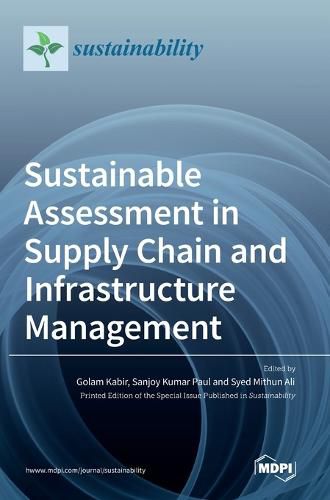Readings Newsletter
Become a Readings Member to make your shopping experience even easier.
Sign in or sign up for free!
You’re not far away from qualifying for FREE standard shipping within Australia
You’ve qualified for FREE standard shipping within Australia
The cart is loading…






This title is printed to order. This book may have been self-published. If so, we cannot guarantee the quality of the content. In the main most books will have gone through the editing process however some may not. We therefore suggest that you be aware of this before ordering this book. If in doubt check either the author or publisher’s details as we are unable to accept any returns unless they are faulty. Please contact us if you have any questions.
In the competitive business environment or public domain, the sustainability assessment in supply chain and infrastructure management are important for any organization. Organizations are currently striving to improve their sustainable strategies through preparedness, response, and recovery because of increasing competitiveness, community, and regulatory pressure. Thus, it is necessary to develop a meaningful and more focused understanding of sustainability in supply chain management and infrastructure management practices. In the context of a supply chain, sustainability implies that companies identify, assess, and manage impacts and risks in all the echelons of the supply chain, considering downstream and upstream activities. Similarly, the sustainable infrastructure management indicates the ability of infrastructure to meet the requirements of the present without sacrificing the ability of future generations to address their needs. The complexities regarding sustainable supply chain and infrastructure management have driven managers and professionals to seek different solutions. This Special Issue aims to provide readers with the most recent research results on the aforementioned subjects. In addition, it offers some solutions and also raises some questions for further research and development toward sustainable supply chain and infrastructure management.
$9.00 standard shipping within Australia
FREE standard shipping within Australia for orders over $100.00
Express & International shipping calculated at checkout
This title is printed to order. This book may have been self-published. If so, we cannot guarantee the quality of the content. In the main most books will have gone through the editing process however some may not. We therefore suggest that you be aware of this before ordering this book. If in doubt check either the author or publisher’s details as we are unable to accept any returns unless they are faulty. Please contact us if you have any questions.
In the competitive business environment or public domain, the sustainability assessment in supply chain and infrastructure management are important for any organization. Organizations are currently striving to improve their sustainable strategies through preparedness, response, and recovery because of increasing competitiveness, community, and regulatory pressure. Thus, it is necessary to develop a meaningful and more focused understanding of sustainability in supply chain management and infrastructure management practices. In the context of a supply chain, sustainability implies that companies identify, assess, and manage impacts and risks in all the echelons of the supply chain, considering downstream and upstream activities. Similarly, the sustainable infrastructure management indicates the ability of infrastructure to meet the requirements of the present without sacrificing the ability of future generations to address their needs. The complexities regarding sustainable supply chain and infrastructure management have driven managers and professionals to seek different solutions. This Special Issue aims to provide readers with the most recent research results on the aforementioned subjects. In addition, it offers some solutions and also raises some questions for further research and development toward sustainable supply chain and infrastructure management.